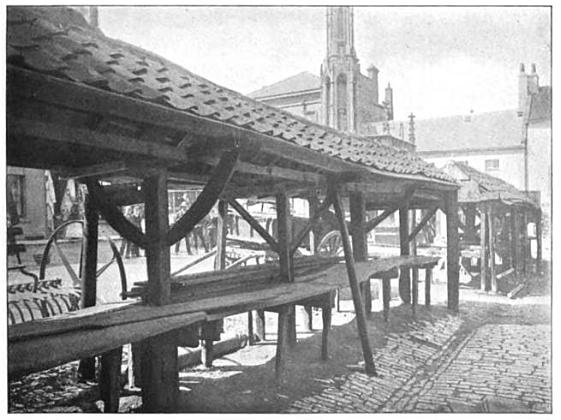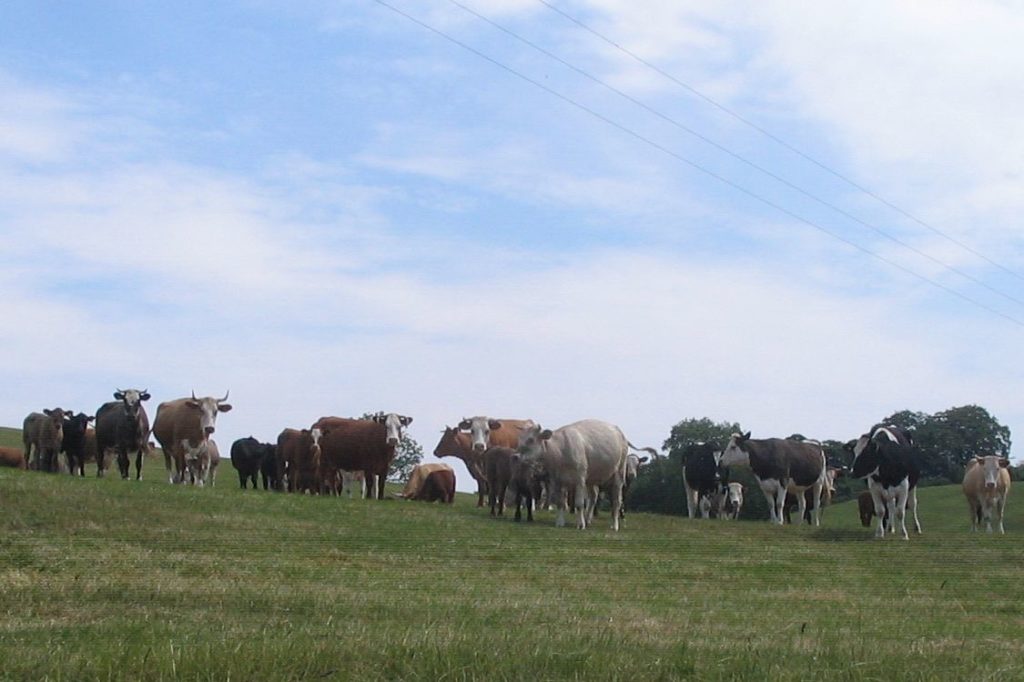Unclaimed Enhanced Content
The enhanced content for Unclaimed is Q&A, some audio content, and photographs.


Q. You’ve called Mark your rock star hero. What drew you to that concept?
A. When I wrote Unveiled, my editor told me she (and the marketing department) were nervous about the possibility of a virgin hero. I told her to let me try it, and if she thought the book didn’t work, I’d change him.
I wanted to make sure that I got to keep Mark as a virgin, and so I made him All The Things: popular, respected, adored by women. I told my editor he was like a rock star because I wanted her to focus on that.
It worked.
Some Pictures From Shepton Mallet



When I wrote that the Shambles in Shepton Mallet had seen as many centuries of service as the public house, I was actually toning things down a little. The shambles that were in Shepton Mallet in Mark’s time were probably older than the public house. Frank James Allen wrote a little article about the Shepton Mallet Shambles in 1903. This is what he had to say:
“A shamble was a stall used for the sale of meat; and the application of the name exclusively to a meat-stall seems to imply that the shamble had some characteristic form, distinct from those of other market stalls… The word is nearly obsolete in its medieval sense; it has got transferred to the place where the animals are slaughtered, and a slaughter-house is sometimes called by the ungrammatical name ‘a shambles.’ In several towns…there are buildings or streets which retain the name of “shambles”; but as far as I can ascertain, these are not real shambles, either in form or in function. There is, however, at least one instance of shambles yet standing as they stood in the Middle Ages, having retained their name and usage until our own times,—and that is at Shepton Mallet, Somerset.”
Allen went on to explain that you can tell from the construction and the curvature of the timber that the shambles at Shepton Mallet dated from around 1450.

At this point in time, it’s almost impossible to see the church from Market Square, and so Mark today wouldn’t have been able to compare Market Cross with the church spires even though they’re only a few minutes distant. But the intervening buildings that block the view are all relatively new.
Question & Answer
Q. What special challenges are there to writing a virgin hero?
A. For this book? Convincing my editor to let me write one in the first place. Beyond that, it was all virgin jokes. So much fun!
In general? I don’t know. I don’t think there are any special challenges. I don’t know why a virgin hero should be any more difficult to write than a virgin heroine. I find it harder to write men who’ve slept with hundreds of women. They couldn’t test for STDs back then, and they had almost no barrier methods worth speaking of. That squicks me out. Virgin heroes? Meh. Simple.
(True fact: yes, they had condoms, but did you know they reused them? Say it together: Ewwwwww.)
Q. Jessica’s reflections on not feeling anything suggest that she’s experiencing some form of depression. Do you think that’s accurate?
A. Yes. When the story starts, Jessica is dealing with the aftermath of a serious depression. I could go into what caused this—a serious illness, a physical attack on her body that robbed her of the right to choose what happened to her, a miscarriage that ended a pregnancy, and a postpartum depression in its own right.
She’s battling a depression that stems from both emotional and biological causes.
Q. So, Mark’s a virgin and Jessica’s a courtesan. Was that extreme contrast part of the vision from the very beginning?
A. Oh, yes. Absolutely.
I think this series was conceived of as, “Pick two natural enemies and then shove them together…” That’s why we have Ash and the woman whose life he ruined in Unveiled, and a magistrate and a criminal in Unraveled. There are other ways that Jessica and Mark are opposite as well. Mark has (for the most part) basically been adored by the world, and Jessica has been reviled by it. Mark is inherently optimistic; Jessica is dealing with depression.
Q. Mark courts Jessica by going on walks with her. Why is that?
A. First, being outside with another person is one of the only ways that you can spend time alone with a member of the opposite sex in complete propriety. (For instance, Lizzy and Darcy walk together alone in Pride and Prejudice).
Second, they didn’t have miniature golf, and small towns wouldn’t have had balls or regular assemblies or any of the other options.
And finally, I just had a lot of fun writing scenes where Mark and Jessica took walks. Maybe too much fun.
I explain why here:
Audio Transcript
Sometimes I have scenes that are almost impossible to write. I go through 10 or 20 drafts before I’m satisfied with what I have. That scene in this book was the scene at the end where Jessica confronted Weston, and it took me forever to write that one. On the other hand, there are sometimes also scenes that work so well, that I end up writing them over and over again, just because I keep wanting to write more things in it. I must have written 20 scenes that were titled “Mark and Jessica take a walk”, and I love them all. The Mark and Jessica taking a walk scenes that ended up in this book are sort of like a Greatest Hits compilation of some of my favorite scenes that I’ve ever written, and I’m really sorry that I couldn’t just spend an entire book with them just walking around, making fun of each other.
The Walk to Glastonbury Tor

It’s a really reasonable walk to get a view of Glastonbury Tor from just outside Shepton Mallet. I know; I’ve done it. If you’re ever there, go to the Tourist Information and Heritage Centre and look for the walking guide produced by the Mendip Ramblers, and you can find Friar’s Oven yourself.
I found the story about Guinevere in a book of ghost tales from the area. I didn’t make that one up.
But I have my own cautionary tale to tell about the road to Glastonbury Tor: Beware the cows.
Oh, those cows. In order to get to Friar’s Oven, you’ll have to pass over a few fields where cows reside. I wrote about my experience at the time:
As I started across the field—and as the cows, 20 yards away, began to amble towards me, I told myself, “Courtney, the cows are just curious. They are coming closer to have a look. Or perhaps, they are just coming this way because they are hungry. In any event, cows are not dangerous. You have nothing to worry about.”
There were a lot of cows. Cows are very big. I realize that is a stupid thing to say, but one can comprehend that a cow is a massive animal, and then one can know that a cow is a massive animal. So here I am, these cows walking towards me in one giant herd, thinking to myself that cows are completely safe, even though they weigh thousands of pounds and could stampede me to death without even noticing I was there.
The cows began to run towards me.
Now, I realize that cows are not exactly considered fast animals. Horses are fast. Cheetahs are fast. My little dog, who I miss very much, is fast. Cows? Are rather on the slow side. But so is Courtney, and besides, Courtney is sitting there saying to herself, “Don’t run, it’s a bad idea, don’t run.” I don’t actually know if that’s true for cows. It’s true for bears, though, and as you may have noticed, I am a city girl.
So, hundreds (well, tens) of cows are running towards me, and I’m thinking, “La la la, cows are safe, la la la, I am not going to run away from cows because they are completely safe, la la la.”
Then the cows started to surround me. No, really. They flanked me on both sides, and they were running to do so. There was tossing of heads. There was direct eye contact. There was lowering of heads in my direction. I don’t have a lot of experience with cows, but none of these things sounded good for Courtney. At this point, I realized that while these fine beasts are about half cows, the other half are calves, and I started to rethink my chant of “cows are safe.” Sure, cows are safe, but aren’t all mothers supposed to be vicious? And… I had beef yesterday. They could smell it on me.
I was still not running. I was walking very, very, very quickly. Luckily, the field was not wide, or I am sure the cows would have done for me. I got to the stile on the other side and scrambled across.
Then I turned around. The cows were all staring at me. The word “bovine” usually is coupled with “placid” and “unperturbable.” Not these cows. Every single placid brown cow eye was narrowed in my direction, promising dire retribution should I return.
I stood on the other side of the fence, my heart pounding. And then I looked at the cows. They looked at me. I shook my fist at them, and said the only thing that came to mind: “Bad cows!”
I promised revenge on them. This is how I did it: I gave them an amazing view in the book. Obviously, I need to work on my revenge skills.

Q. Why is this book called Unclaimed?
A. On the most basic level, I suppose you could say it’s because Mark has never had sex, so he hasn’t yet been claimed. Meh.
But I think that all of the titles in this series represent something good that happens to both the hero and heroine. In Unveiled, both Margaret and Ash have to let each other see themselves. Margaret has to stop being afraid of losing her position in society. In Unclaimed, Jessica has been territory, marked by other men. I think the scene where she masturbates, and is able to feel like her sexual response no longer belongs to anyone else, is one of my favorites in the book. It’s the point where she stops being claimed by others. Mark, too, needs to stop feeling that he owes others simply because he wrote a book about chastity. For them both, unclaiming themselves is a good thing.
Q. What was Mrs. Turner’s mental illness?
A. Honestly, I’m not sure I’m capable of diagnosing her in fiction. But I can tell you what it wasn’t—it wasn’t Mr. Milan’s favorite sexually-transmitted disease. (For the record, his favorite disease of all time is rhabdomyolysis.)
I’ll let him explain to you why he has a favorite sexually-transmitted disease.
Audio Transcript
Courtney Milan: When I get stuck on my books, I go for walks with my husband, and I complain about why the book isn’t working. The conversation usually goes like this: I say “There’s not enough conflict between the hero and heroine. I can’t figure out why they don’t just jump in bed.”
Mr. Milan: Hi, I’m Mr. Milan. When Courtney says things like this to me on walks, the idea that pops into my head is usually “Well, she probably has chlamydia.”
Courtney Milan: As you can imagine, this is not really a workable idea. I usually find it difficult to write books, especially historicals, in which you can neither detect nor treat chlamydia, but he always suggest it, and when it came time for Unclaimed, I decided I was going to indulge his rapacity for STDs. I played around with the idea of having Mark’s mother be unstable because she was in the end stages of syphilis. The problem was that Mark was really young when his mom started going crazy, and syphilis takes a really, really long time to actually get to those end stages. So in order for the timeline to work, it would have to be the case that she had contracted syphilis before she got pregnant with Mark. Which means…
Mr. Milan: Syphilis, score!
Courtney Milan: Yeah. Virgin syphilitic hero. I bet nobody’s done that one before.
(Just to clarify: This is intended as sarcasm. Mark does not have syphilis.)
Q. Amalie is never physically present in the book, but her importance to Jessica is obvious. What was their relationship like when Jessica first came to London?
A. Amalie is about seven years older than Jessica, and so I suspect that their relationship started off as mentor/student rather than as friendship, and then over the years grew into more. I always imagined they started off something like this:
Jessica: YAY! I’m here in London and this is AWESOME and I don’t have to listen to my dad at all and I don’t miss my family ONE BIT NO NOT EVEN A LITTLE and all these men want me. Plus, parties!
Amalie: …
Jessica: THIS CAN NEVER GO WRONG. Why doesn’t every woman do this?
Amalie: …
Jessica: I mean, aside from the ruined forever thing, which is kind of a bummer.
Amalie: Pregnancy.
Jessica: Uh… Wait. Tell me more about that.
Amalie: What’s to tell? You seem like a smart girl. You’re using sheaths and sponges, right?
Jessica: Er…
Amalie: And besides, if you get pregnant, I’m sure the contract you have says he’s going to take care of you.
Jessica: Er…
Amalie: And even if it doesn’t say that, I bet you’re putting away a portion of the money he gives you every month, aren’t you?
Jessica: These things you are saying… They sound so oddly calculating. He loves me. What more do I need?
Amalie: Of course he loves you. But do you think he’ll stop loving you if you have money in the bank?
Jessica: Why are you telling me these things? I’m your competition.
Amalie: When we take up this position, we leave behind our families—our mothers, our fathers, our sisters. We can’t look back. To them, we’re dead. Worse than dead. You’re not my competition. You’re my sister.
Q. What is Mark’s relationship with religion?
A. I grappled with how much religion to include in this book. This is not an inspirational romance—and I am hardly the author to write the inspirational version of this story, because whatever my confused religious leanings, I am on the wrong side of the pond to be Anglican. Given the time and place when Mark lived, he would be. And given his inclinations, Mark would not just be a perfunctory Anglican. He had to be a man of deep religious convictions. I didn’t see any other possibility. The question was how to convey that in his character without making people feel that it was preachy.
I mention him attending service. He references the Bible. He thinks various thoughts that are moral on a philosophical, if not religious level, and he’s all too aware of hypocrisy in others when it comes about.
At one point when Mark is very troubled about how he feels about Jessica, he goes on a walk. In the first draft of this book, I actually explicitly mentioned that he prayed. It had nothing to do with whether I think that people should or shouldn’t pray; it was simply that I felt that Mark as a character would. My editor thought this would put some people off, and frankly, I had already felt uneasy about it. I changed the section so that Mark recited to himself lines from a prayer in the 1830s Book of Common Prayer.
Q. So what exactly is Mark’s full Bible-verse name?
A. It isn’t spelled out in the book, because it is, in fact, a very gruesome verse! Mark does refer to it by chapter and verse. It is Mark 9:47.
And that reads: “And if thine eye offend thee, pluck it out: it is better for thee to enter into the kingdom of God with one eye, than having two eyes to be cast into hell fire.” Nice, right? (I use the King James Version because that’s what his mother would have used.)
Q. On the original cover for Unclaimed, Mark and Jessica are wearing matching rings, ones that are like the ring Mark is wearing in the book. How did you get the art department to do that?
A. Sadly, it didn’t happen that way. The first draft of Unclaimed had no ring in it. I sent it to my editor. I was working on revisions when she sent me the cover art.
I think my response was something close to, “Wait, why are they wearing big honking matching rings? Can we Photoshop those out?” The answer was no.
So I gave Mark a ring in the book. It actually was a good solution to a problem with that first draft—that Jessica needed some proof that she’d seduced Mark, and taking his underwear would be (a) gross and (b) not very good proof.
Q. Why does Mark go to Smite instead of Ash?
A. Because when it comes down to it, Smite knows Mark better than Ash does. And because Mark has a puppy for Smite.
I don’t approve of the random gift of a dog—dogs are a lot of work, and giving someone a puppy is kind of like giving them a sinkhole of need and attention—but Mark definitely knows Smite well enough to know that what he needs is a puppy.
Q. Jessica’s story touches on some extremely sensitive topics—not least, the forced abortion that Weston inflicted on her. Did you ever balk at addressing these things?
A. I have wanted to write about a courtesan heroine who had an abortion forced on her—the idea that someone would feel that he owned her so much that he could do that to her, and what she’d have to do to get out from under him and reclaim herself…that just really worked for me. So, no, I didn’t balk at it.
I was worried I would have difficulties getting that past my editor, but she didn’t even blink at that.
Q. What’s the deal with all this Lancelot/Guinevere stuff?
A. This book has repeated references to the Lancelot/Guinevere legend. In the enhanced edition of Unveiled, I mentioned that the story was intended to pay homage to Arthurian legend. Actually, the entire series is. In some versions of Arthurian legend, Lancelot was a virgin…up until he and Guinevere fell in disastrous love. Obviously, this is not a retelling of Lancelot/Guinevere, because it is a romance, and that story does not have a particularly happy ending. Or a particularly great middle. The beginning isn’t awesome, either. But still, this was the general gist of it.
But as always, I wanted to muck it up a bit. Mark is a literal knight, but Jessica is the one who is an extraordinary marksman. And it’s not a physical danger that Mark rescues Jessica from, but the emotional danger of depression.
Q. Be honest. How long had you wanted to end a story with the heroine dueling for the hero’s honor?
A. Oh, I wish I could lie and say that I always intended it. But I pulled up the synopsis that I put together for this book before I had written it, and this is what I said was going to happen:
Together, along with John, Mark and Jessica hunt down Dinah and Edmund Dalrymple in the inn where they’ve taken a room for the night. Dinah is confused and scared. She thinks she has no choice but to do as Edmund says. After a scuffle, in which Jessica shoots Edmund, Tolliver agrees to marry Dinah and her reputation is saved.
In other words, I hadn’t planned this ending at all.
Er. You’ll notice from that snippet from the synopsis that in the original version of the story, the antagonist was going to be Edmund Dalrymple. (See all that antagonism set up between Mark and Edmund in Unveiled? It was there for a reason! A reason that I abandoned because the book just did not work as well with Edmund as the villain. Too much unnecessary involvement of Ash and Margaret.) And that Edmund was going to run off with Dinah—Dinah, by the way, is the rector’s daughter—and Tolliver was going to come along and save them, and Jessica was going to shoot Edmund, and is that complicated enough for you? You should be very glad I changed it, and now you see why.
Re-centering the backend of the plot around the romance meant that the confrontation with the newly renamed villain—Weston—had to be about Mark and Jessica. Not about someone else.
I wasn’t even trying for it. It’s just that once I got to that point in the rejiggered setup, it seemed natural. Why would Mark fight a duel for Jessica? Mark’s a terrible shot.
I know people might not believe me, but I don’t always set out to try and flip tropes. It’s just that sometimes I stub my toe against one and realize that it just looks better flipped the other way around.
The Turner Series Reading Order
...or get all four books as a digital boxed set
